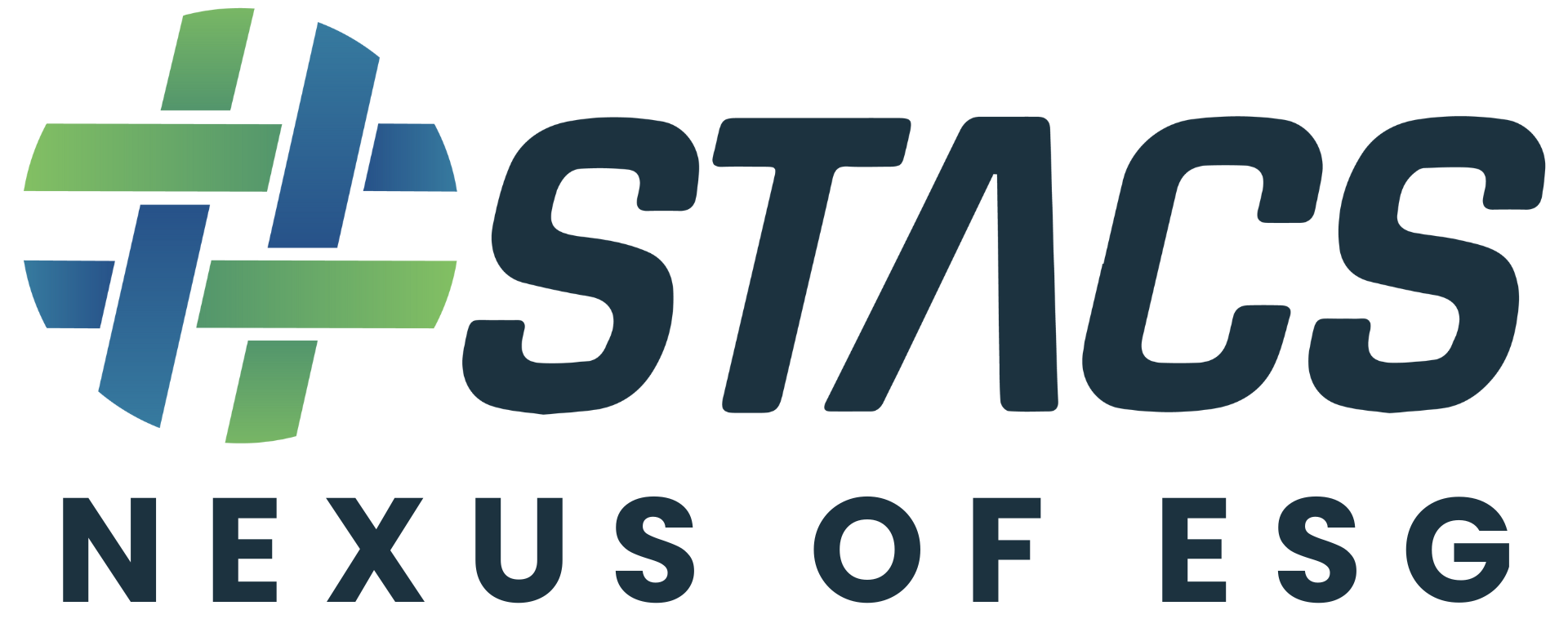Guide to Sustainability Certifications for businesses – ESGpedia ESG Data Dictionary
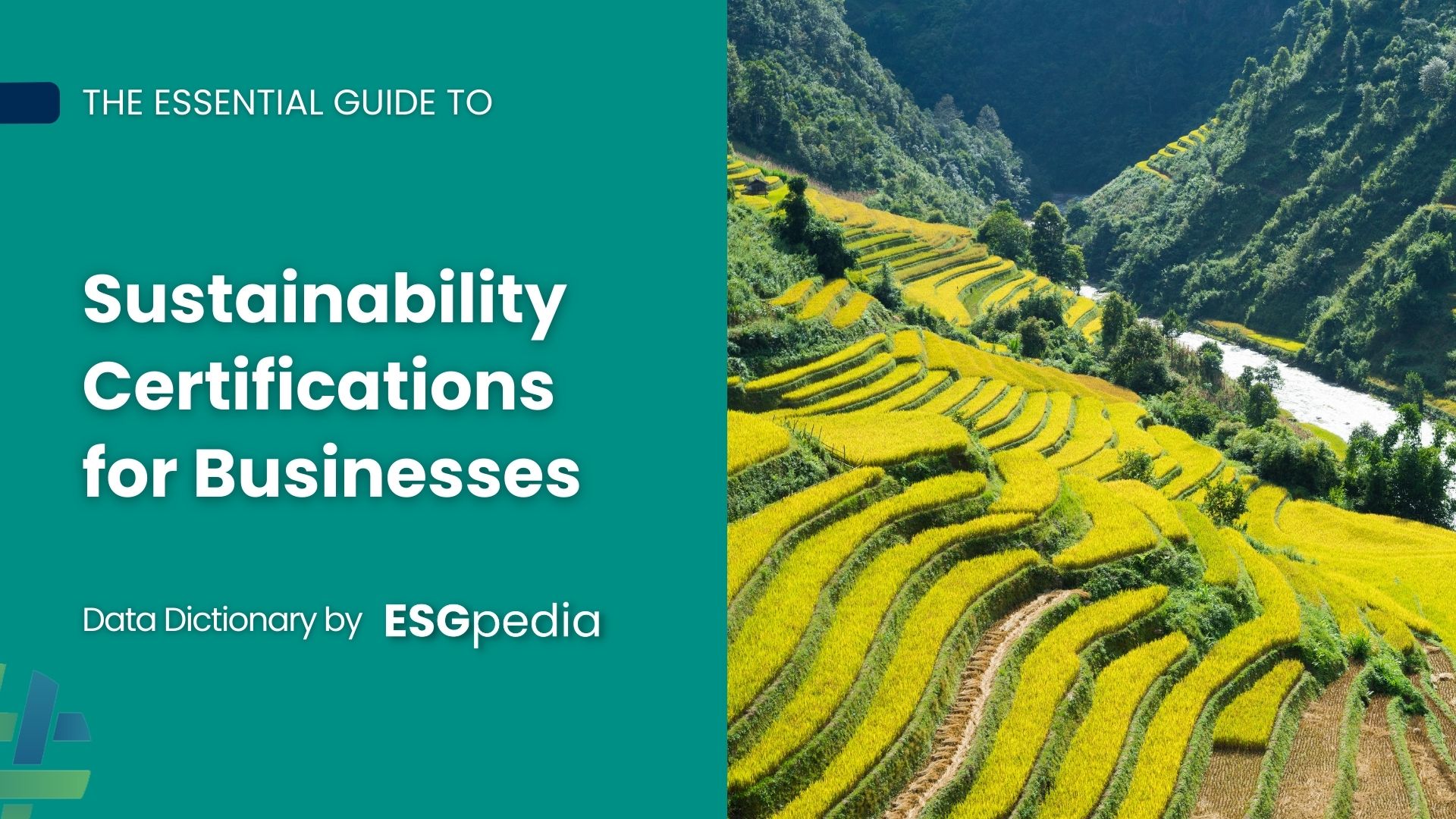
What is Sustainability Certification for businesses?
Sustainability certification is a third-party verification process attesting to a company’s commitment to sustainability. Sustainability certificates evaluate a company’s performance along Environmental, Social, and Governance (ESG) dimensions by taking into account a wide range of factors such as the business’ environmental impact, labour practices, supply chain management, and its impact on communities, among others.
The standards required by different sustainability certificates, however, differ according to the criteria and requirements established by different registry bodies. Ultimately, sustainability certification aims to provide verification for a company’s sustainability efforts and offer an objective measure of its performance to stakeholders such as customers, investors, employees, and the public at large.
Sustainability Certification vs Sustainability Reporting
Compared to sustainability certification, sustainability reporting refers to the disclosure of a company’s sustainability and ESG performance to various stakeholders, similar to those mentioned above. Common sustainability reporting frameworks include the Global Reporting Initiative (GRI), Sustainability Accounting Standards Board (SASB), and the Task Force on Climate-Related Financial Disclosures (TCFD).
However, the greatest divergence between sustainability certification and reporting occurs in the degree of obligation. While sustainability reporting is mandatory for certain businesses in several countries, sustainability certification is a purely voluntary endeavour.
Note: ESG and Sustainability reporting have become increasingly synonymous. For the purposes of this article, we will be using these terms interchangeably.
Why, then, would businesses pursue sustainability certification?
Businesses stand to benefit greatly from pursuing sustainability certification as sustainability continues to be a key driver of business success and competitiveness. Some benefits are listed below:
Encourages Companies to Kickstart their Green Journey
Pursuing sustainability certification can drive companies to take the first step in their green journey – collecting their emissions data. Certain certificates require companies to collate their past year’s data, such as the LowCarbonSG Participant Logo, which requires companies to use CERT, the Carbon and Emissions Recording Tool, to submit their carbon emissions data from the past 12 months. Other certifications tier their sustainability program, requiring companies to increase their efforts towards sustainability as they progress in their green journey, such as the Green Freight Asia (GFA) Label, which requires applicants to publish a Greenhouse Gas report at Leaf 4 – the highest tier of GFA certification offered.
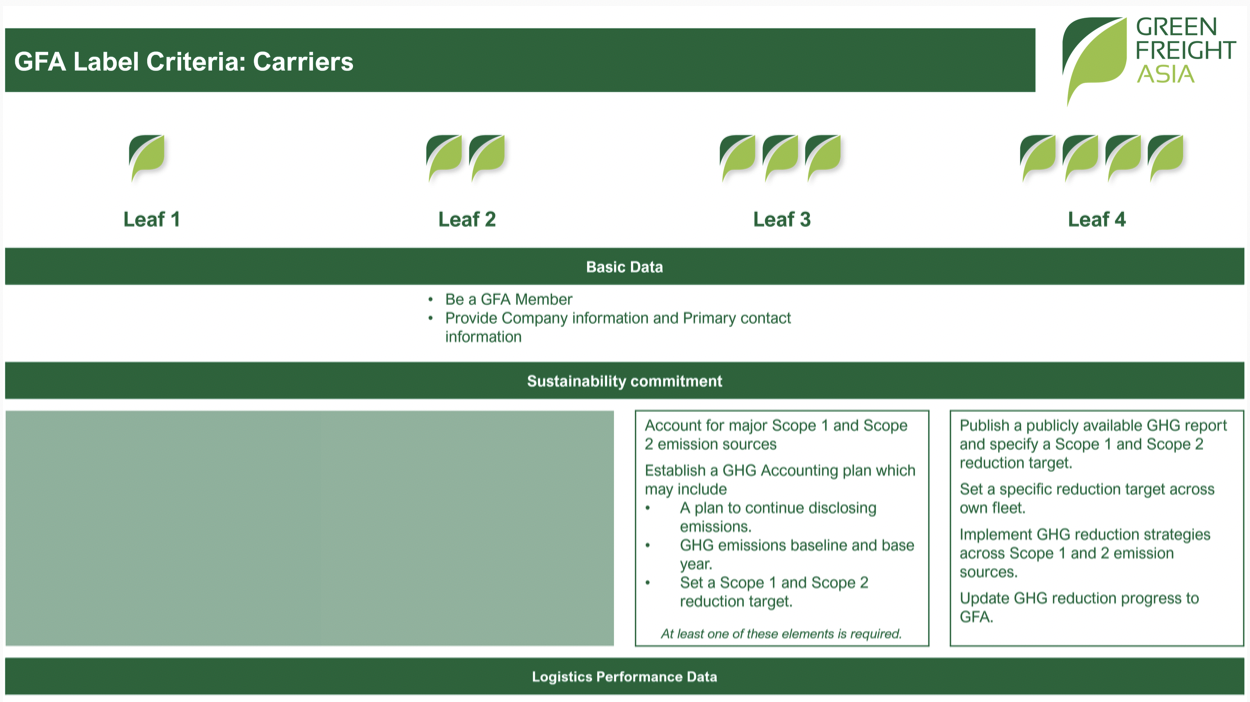
In these cases, companies pursuing sustainability certification essentially embark on a “programme”, giving them a goal to work towards in their green journey. By taking this first step towards sustainability, companies can create a foundation for future improvements and demonstrate their commitment to decarbonisation.
Read about our partnership with Green Freight Asia to greenify the transportation and logistics sector here.
Increased Attractiveness to Stakeholders
Pursuing sustainability certification enhances a business’ attractiveness to consumers, large corporates, investors, and financiers alike by denoting the presence of a robust and structured sustainability programme within the company, giving them an edge over their competitors. This is especially so for Small and Medium Enterprises (SMEs).

Businesses may also qualify for sustainable finance as a result of meeting the sustainability standards required by these certifications. For example, OCBC Bank offers green loans to certified sustainable businesses meeting the BCA Green Mark 2021 GoldPLUS standard for energy efficiency. Pursuing sustainability certification would thus open this avenue for financing for businesses.
Verification of Sustainability Claims
Today, emissions data published through ESG disclosures might not be enough to demonstrate a company’s progress in sustainability relative to its competitors. Sustainability certificates thus provide third-party verification of a company’s sustainability claims, lending it greater credibility and decreasing the risk of accusations of greenwashing.
Additionally, these certificates also provide manufacturers and retailers with information about the origin and sourcing conditions of raw materials or semi-finished goods. Consumers are also thus able to shop with greater assurance that their purchases generate limited negative environmental and social impact.
Enhanced Branding and Reputation
Sustainability certification also serves as a “badge of honour” of sorts, denoting the significant strides a business is making in their sustainability efforts. As put forth by Tan, “Businesses often prominently display these certifications in their sustainability reports and websites to the public as a way to showcase their accomplishments and commitment to sustainability”.
While sustainability reporting can be done without certifications, they work hand in hand with reporting to help companies effectively communicate their sustainability efforts to the public, building a stronger, and more positive reputation for their brand.
Considerations for Companies
While pursuing sustainability certification affords a number of benefits, there remain certain factors businesses need to take into account, with cost-related factors being one of the most prominent points of consideration. In addition to the fees required for the certification process, investments in new equipment, staff training, and other operational changes to meet the certification standards may also be required. These additional costs may be particularly challenging for SMEs with limited financial resources and who are mostly focused on their bottom line.
However, governments are increasingly offering sustainability-related grants and subsidies to help companies attain sustainability certification. In Singapore, for example, businesses may qualify for the various programmes under Enterprise Singapore’s Enterprise Sustainability Programme, such as the Sustainability-as-a-Service programme by TÜV SÜD PSB. Under this programme, eligible companies can be granted 70% funding of qualified costs for the certification process.
The Green Journey
Typically, businesses begin their green journey by conducting a sustainability assessment to better understand their starting point. This phase usually includes businesses calculating their corporate carbon footprint, collecting their emissions data, and conducting an analysis on their sustainability performance in other areas. Having better understood their starting point, businesses can move on to set sustainability goals that align with their corporate values and importantly, their stakeholders’ requirements and expectations.
From there, businesses can begin developing sustainability strategies that outline the actions they can take to achieve these goals, such as improved energy and resource efficiency, waste reduction, sustainable sourcing, and more. This phase is perhaps where most businesses begin pursuing sustainability certification, working towards the targets that would enable them to qualify for and attain the certificates. In these instances, pursuing sustainability certification serves as a ‘sustainability programme’ for businesses to embark on.
To track their progress towards their sustainability goals, businesses will also likely establish monitoring and reporting processes or mechanisms that measure their sustainability performance. The data collected enables businesses to evidence their sustainability efforts and provide regular updates to stakeholders about their sustainability performance, demonstrating their commitment to decarbonising.
Create your corporate profile on ESGpedia for free today to kickstart your sustainability journey.
ESGpedia Data Dictionary – A Repository of Certification Bodies, Assurance and Data Partners
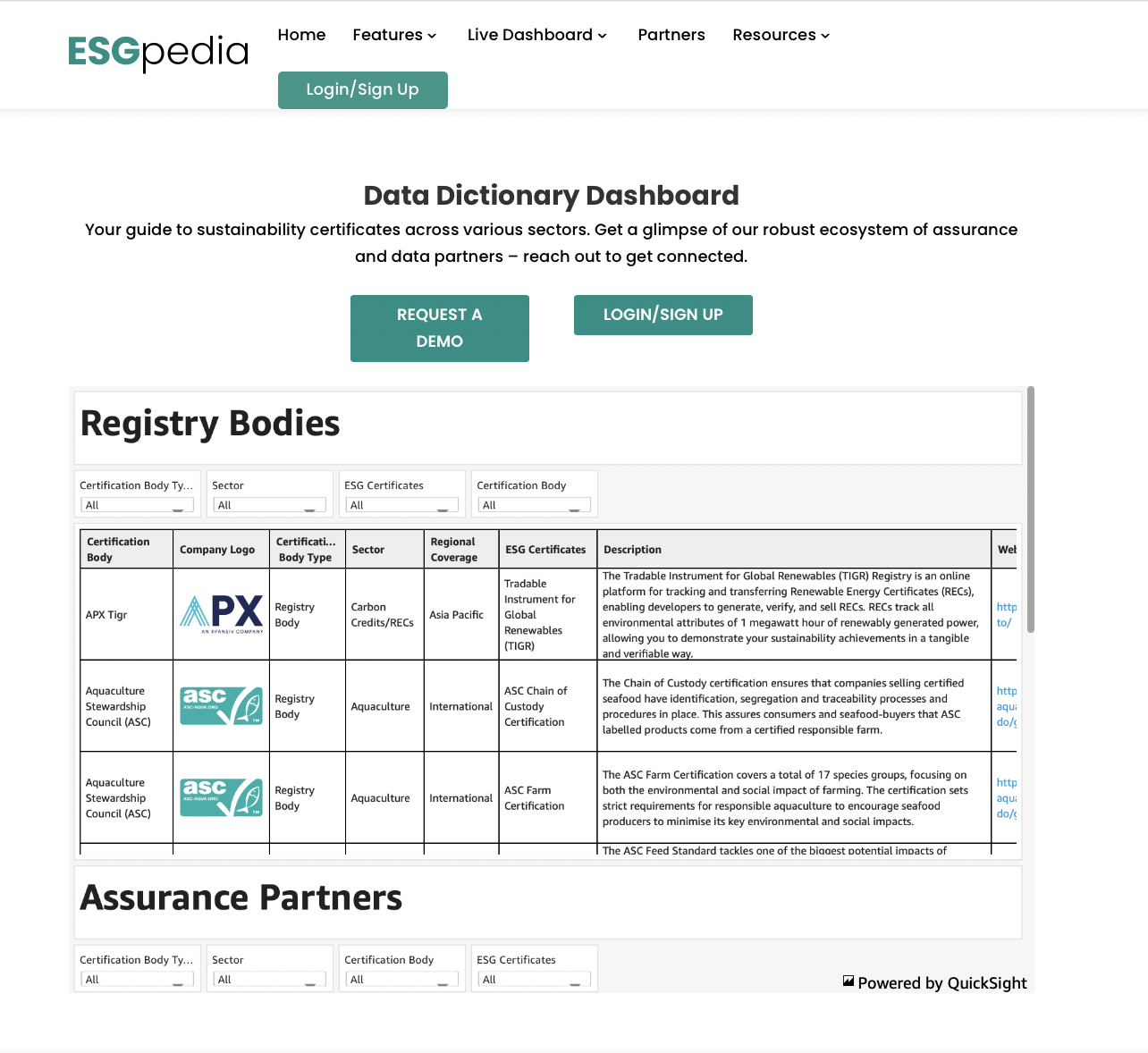
ESGpedia’s Data Dictionary dashboard empowers companies to take the next step in their unique decarbonisation journey. Housing information on Certification Bodies, Assurance, and Data Partners, the dashboard offers businesses a clear overview of the different certificates across various sectors and their respective characteristics, as well as provides access to STACS’s robust ecosystem of assurance and data partners.
These entities meet the needs of companies in different ways:
Certification Bodies
Due to the plethora of sustainability certificates available, a commonly asked question amongst companies deciding to pursue sustainable certification is, “Which certificate should I be going for?” For example, within the Built and Construction Sector alone, there are multiple certification bodies offering sustainability certification which focus on different aspects of sustainability.
ESGpedia’s Data Dictionary’s library of Certificate Bodies, which can be filtered according to industry, tackles this issue by providing companies with an overview of the commonly used certificates in any specific industry.
Benjamin Tan shares, “As companies deliberate their ESG targets and objectives, they should take the chance to speak with their customers to better understand the demand-side needs pertaining to sustainability. From there, companies can reference the description of the different certificates within that industry on the Data Dictionary and choose to pursue the certification which best meets their customers’ needs.”
Assurance Partners
Companies who wish to publish sustainability reports and ESG disclosures may wish to engage assurance partners to carry out an audit to ensure it aligns with the ISO 14064-1:2021 Greenhouse gases – Part 1 standard, one of the most commonly used standards across businesses. Assurance partners are independent third-party organizations who review a company’s sustainability report and provides an assurance statement that attests to the reliability and accuracy of its information. Some assurance bodies include the British Standard’s Institution (BSI), Bureau Veritas, and TÜV SÜD PSB.
These entities work with the company to determine the scope and objectives of the sustainability report, then proceed to review the data and information presented to ensure its accuracy, and consistency with industry standards.
For companies who may be seeking to publish sustainability reports to advance in their journey towards decarbonisation, the Data Dictionary provides a quick snapshot of the different sectoral and regional coverage of the different assurance partners.
Data Partners
For companies who may be looking for solutions with emissions reduction solutions, Data Providers present themselves as a valuable partner to onboard. Data providers help companies with emissions reductions in a variety of ways, such as carbon accounting, disclosure, supply chain tracking, supplier sustainability monitoring, among others. ESG Data Partners may also provide companies with benchmarking data, enabling them to compare their sustainability performance with that of their peers and identify areas of improvement.
Data providers are also able to assist in the sustainability reporting journey, by helping to map a company’s ESG data and disclosure to the framework of choice (e.g. GRI, SASB, TCFD).
On ESGpedia’s Data Dictionary module, companies are able to comb through the list of Data partners and decide which Partner’s services and expertise best suits their needs, negating the hassle of having to search for these data providers one-by-one.
Reach out to STACS via email if you’d like to get connected to any of our partners.
Major Certification Bodies across Industries
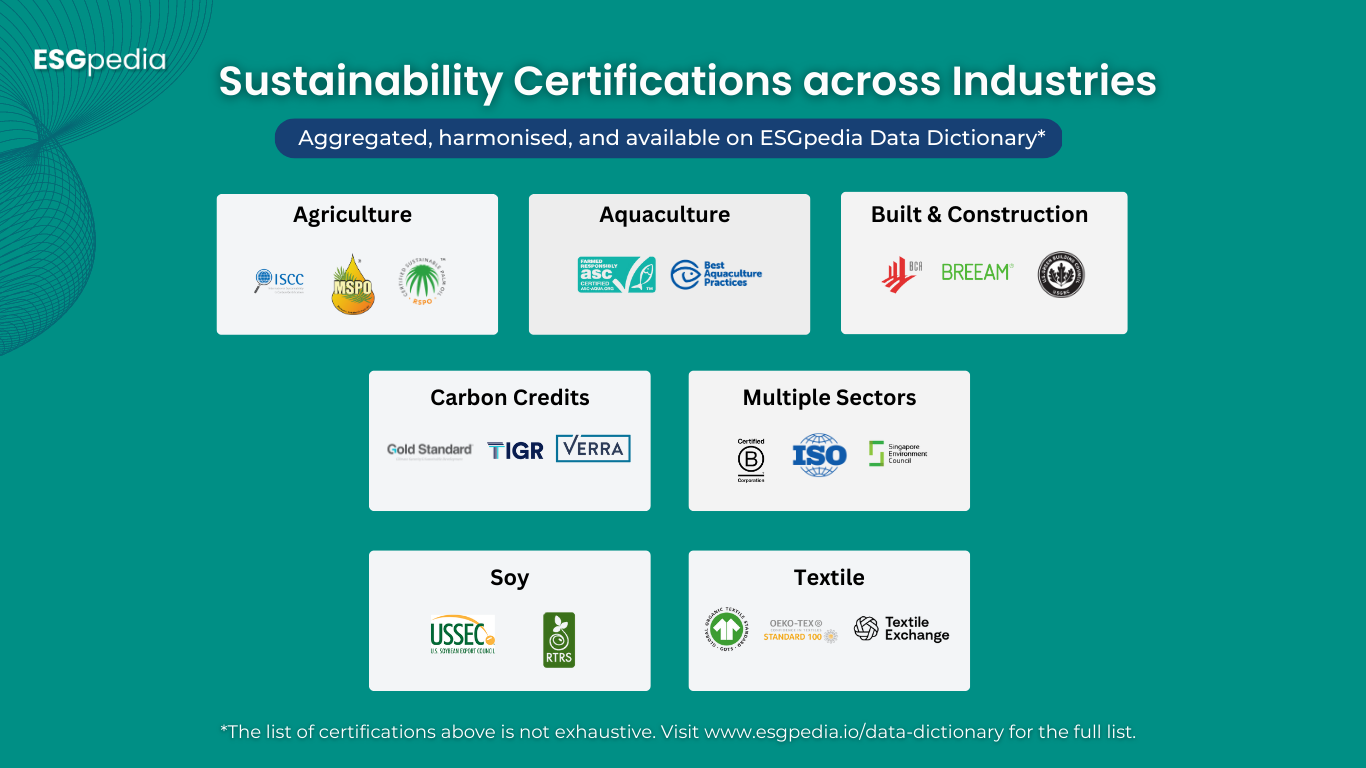
Having decided on pursuing sustainability certification, businesses often ask, “What is the best certification for my industry?”. What’s ‘best’, however, differs greatly from company to company, owing to differences in each business’ ESG goals, objectives, and customer needs. Speaking on the matter, Tan adds, “Ultimately, the ‘best’ sustainability certification is the one which meets the needs of your clients and industry, while facilitating your business’ progress towards its sustainability objectives. On this front, trade associations often possess the greatest clarity on which certificates would benefit businesses the most.”
Connect with us to find out the latest sustainability certification recommendations by trade association.
Utilising the ESGpedia Data Dictionary
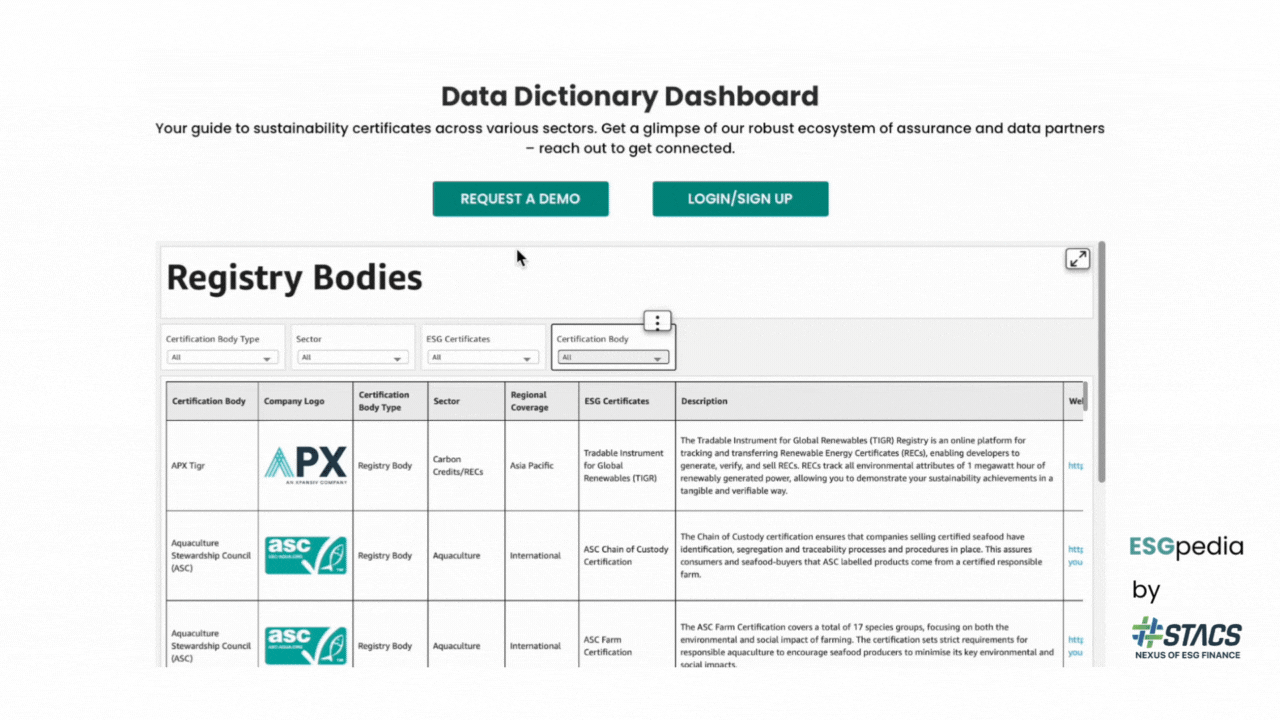
Steps:
- Select the Sector(s) which Business is in
- On top of selecting their core industry (e.g. agriculture), companies could also select the Multiple Sector checkbox, which will display information on sector-agnostic certificates
- Scroll through to read the Description column
- Click on the logo to find out more from the Certification Body’s website
Take the Next Step in Your Green Journey
Connect with us today to get in touch with our wide array of Certification Bodies, or to learn more about the digital tools on ESGpedia has on offer to help your business succeed on its sustainability journey.
PRESS CONTACTS
If you are a journalist with media queries, contact us.
